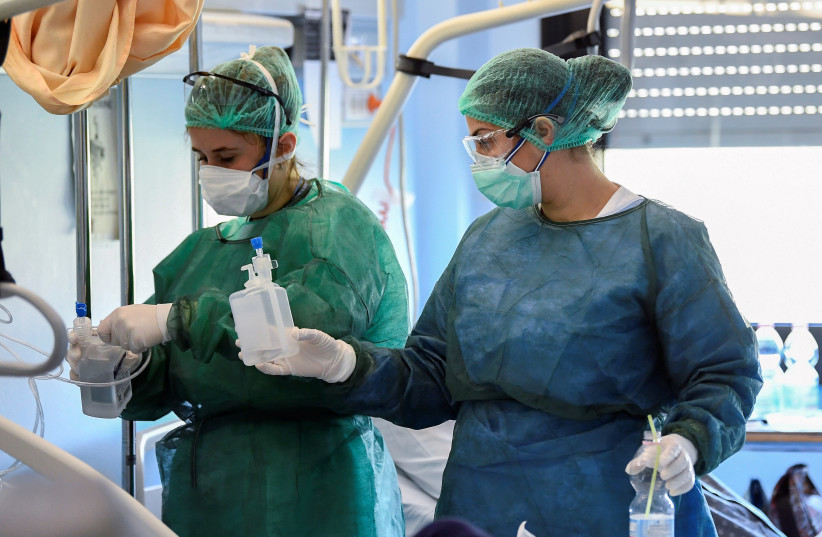Over 4,000 people are infected * 22-year-old in critical condition * Random virus testing starts Monday at three groceries

Three more Israelis died from coronavirus on Sunday, bringing the total number of victims to 15, as numbers of infected people surpassed 4,000 and discussions about increasing restrictions on the public continued.
On Sunday, Prime Minister Benjamin Netanyahu and officials from the Health, Finance and Defense ministries shifted their focus slightly to considering restrictions on some specific pockets of society, such as the haredim (ultra-Orthodox), many who continue to ignore certain guidelines.
“What is happening in Bnei Brak is like Italy,” one doctor from a major hospital in the center of the country told Channel 12 over the weekend. “Almost every haredi who is tested for the virus is found positive. There are families with 100% infection. The Health Ministry needs to go door to door, and take the sick from their homes. If not, in another few weeks, we will see them coming in by masses.”
Haredim constitute as much as 50% of coronavirus patients hospitalized throughout the country, Channel 12 reported: Schneider Children’s Medical Center for Israel 50%; Sheba Medical Center, Tel Hashomer 60% in ICU, 50% in other units; Shaare Zedek 50% to 60%; Hadassah Ein Kerem 40%.
The Health Ministry is considering instituting a full lockdown only on those areas where cases are particularly widespread, such as Bnei Brak in general or neighborhoods within the largely haredi town.
The government is still considering expanding restrictions throughout the country, too, which could include decreasing the number of workers allowed in the office from 30% to 15%, requiring staff to work in shifts, or asking employees if they have symptoms before they are allowed to enter the workplace.
At the same time, the government has committed to increasing coronavirus tests per day to 30,000 within two weeks.
On Sunday, the Health Ministry tested close to 6,000 people and is expected to reach 10,000 people per day sometime this week. Senior health officials say increased screening will enable the Health Ministry to better understand how much the disease has spread throughout the country and help identify coronavirus hot spots.
On Monday, the Defense and Health ministries, the Home Front Command, two Rami Levy grocery stores and one Victory supermarket will pilot a new program in which shoppers will be tested for coronavirus upon entering the stores. If the pilot is successful, this could become the new normal.
Interior Minister Arye Deri and Jerusalem Mayor Moshe Lion agreed Sunday to open two new coronavirus hotels in the city to accommodate large families, one hotel will target sick patients and the second will be available to those who require isolation but have nowhere else to stay.
Meanwhile, victim No. 15 is an 84-year-old woman who was being treated at Jerusalem’s Shaare Zedek Medical Center. Victim 14 is a 90-year-old woman who had been hospitalized at Ma’aynei Hayeshua Medical Center in Bnei Brak, and the 13th dead is a 92-year-old man who was admitted last week in serious condition to Shaare Zedek.
All of those who died had pre-existing medical conditions.
At press time, 4,247 Israelis had coronavirus, according to the Health Ministry – 74 people were in serious condition, among them a young man in his 20s who was hospitalized at Assuta Ashdod University Hospital.
The numbers represent an increase of 628 people in 24 hours.
The young man, who doesn’t have any pre-existing medical conditions, began his treatment with mild symptoms, a spokesperson for Assuta said. But in recent days his situation deteriorated, and doctors decided to intubate him.
“Toward morning, the patient’s respiratory condition worsened,” said ICU head Meir Ami, who noted that his condition is stable and he is responding well to treatment.
In an interview with Channel 12, the patient’s mother cried, describing how she told her husband, “Our son is sick, and we cannot be by his side, we cannot help him.”
She noted that he had returned to Israel from the United States with two friends last week, both who have coronavirus too. But only he is in critical condition.
So far, the majority of coronavirus patients in Israel are between the ages of 20 and 29 (67.5 out of 100,000), the Health Ministry reported. The second largest group of infected people (56.7 out of 100,000) are between the ages of 50 and 59.
Of those diagnosed with the virus, the majority continue to have mild symptoms: 3,944. The rest have moderate symptoms (82) or have recovered from the virus (132).
There are 500 people hospitalized with the virus and 59 on respirators, according to the Health Ministry.
In addition, as of Sunday morning, some 3,637 medical professionals are in isolation, among them 892 doctors and 1,229 nurses; some 141 who have been diagnosed with coronavirus.
As reported by The Jerusalem Post
